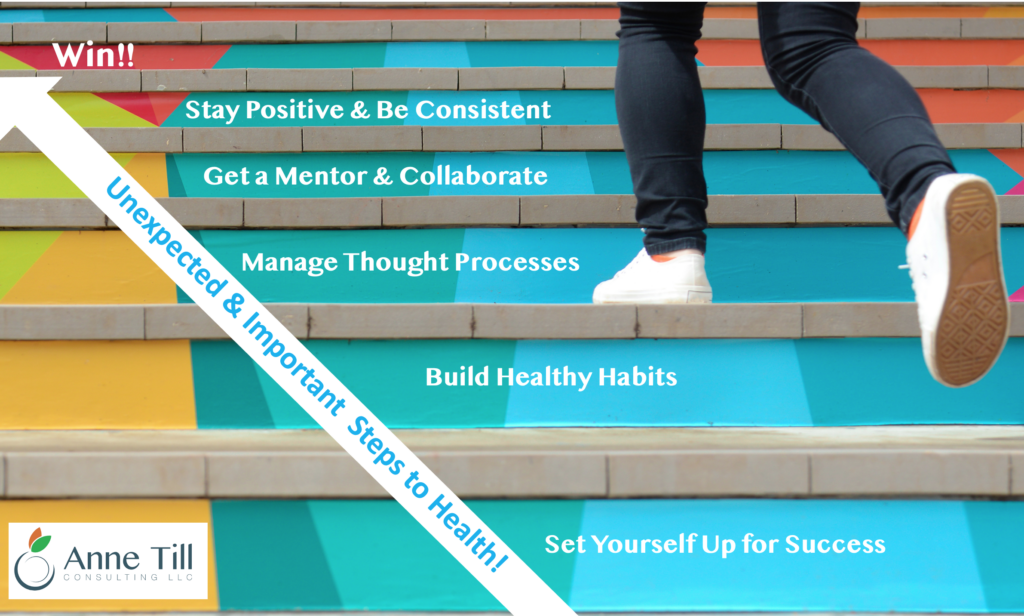
Fit & Fabulous – 5 Important Steps to Better Health In 2023!
Anne Till MNutr., RDN, LDN
The new year is around the corner. Some f us are still reeling from the aftermath of the pandemic, and traditional motivation to set goals for a New Year may be slim to none. Friends and family and even ourselves may be weary after 2-3 years of dealing with the pandemic and adjusting to a new “normal”. No matter where you are and how you feel let’s not forget ourselves, that we do count, and our health remains important! Fit and fabulous needs to be your mantra – be determined that 2023 will be a great year for your health. If this is your plan – how can you be successful you may ask, what steps can you take, and what tools can ensure your success?
Having worked with people one on one for over 30 years, I do know that having a plan and getting support is important. Nutrition information is very helpful, and an individualized meal plan is beneficial. But most often it’s the non-tangible things that make the biggest difference. Here are 5 key steps you can take this year to support your success even within the confines of the pandemic.
1.Set yourself up for success
Proactively take steps to shape your environment to support your intentions. Consider opportunity and access when it comes to carrying out a behavior.
If your goal is to eat more fruit and vegetables but you have no fresh produce in the house or workplace, then it is unlikely that you will achieve this goal. Set yourself up for success – plan and shop accordingly and be prepared so that you have what you need when you need it.
Similarly, if you plan to lose weight, it is helpful to have nutrient-rich, high-volume foods (whole foods that are also relatively lower in calories) on hand at work and at home so that making healthy food choices is easy, convenient, and supportive of your weight loss goals.
Likewise, if your goal is to be active, then planning specific times in your schedule and buddying up with a friend or joining a group will increase the likelihood of you sticking to your activity goals!
Here are a few steps you can take to shape your food environment to support healthy eating goals:
- Complete an inspection of your pantry, freezer, and refrigerator to identify calorie-dense ultra-processed foods you can remove or replace with other options.
- Restock your home with foods that support your goals: fresh and frozen veggies and fruit, whole grains, skinless chicken, eggs, fish, reduced-fat dairy or protein-rich alternatives, and healthy pre-portioned snacks.
- Be prepared – make sure you have healthy choices when needed. This may mean you need to take meals and snacks to work and/or plan ahead for meals and snacks if you work from home.
- Think ahead – have the foods you need for dinner on hand and/or pre-prepared so that the decision-making about ”what to eat” is already made when it’s time to eat.
- Use an online meal planner to help organize your meals. You can also work with your dietitian to come up with a food plan to support your goals.
2. Focus on habits, not goals
Habits by definition refer to an acquired behavior that has become nearly or completely involuntary. Habits, when established, are easy to maintain and produce automatic outcomes. Forming habits allows us to shift difficult tasks into non-thinking and easy-to-complete behaviors, putting us on a kind of “autopilot”.
For example, brushing your teeth is a habit that requires little thought and planning. It has been practiced so often that it happens almost automatically to produce an outcome of fresh breath and good dental hygiene.
Health behaviors are much easier to maintain if habits are created. In turn, health outcomes (such as physical fitness and healthy body composition) are sustained automatically when our habits are maintained.
Habits help us to form new neurological pathways that make it easier for our brains to complete certain tasks. The science of habit building can be complicated, but a simple example can help to explain how to go about building habits.
Let’s use the example of getting physically fit in 2022. First, commit to building an exercise habit rather than focusing on the amount or intensity of the exercise you plan to do. To establish a new habit, it’s best to add it to an existing routine. Your brain will more readily include a new behavior if you attach it to something you’re already doing. To build a walking habit, for example, you could plan to take a walk after you get up each morning. As you always get up every morning, your brain will quickly adjust and incorporate walking into your new routine.
It is also normal, however, to face a certain amount of inertia when it comes to building new habits as one often prefers to default to an old pattern of behavior of “not exercising” in this example. To help overcome the inertia, shorten the commitment and make the goal smaller. Allow yourself to do a much shorter walk (say 10 minutes) so that it is easier to fit into your routine and does not seem so overwhelming. Be committed to the habit every day even if it is short duration and low intensity, as this will create neurological pathways that will establish the new habit.
Habits can be created within about 66 days depending on the habit being built. Once the pattern of behavior is established you can expand on your goals. In the exercise example discussed above, when the habit is established then the intensity and duration of exercise can be easily increased. The science of habit building can be applied to many other health behaviors like meal planning, meal prepping, drinking water, improving sleep, managing stress, and many others.
3. Avoid catastrophic thinking
An all-or-nothing approach does not serve anyone well when it comes to pursuing health goals. I frequently use an analogy of a cross-country road trip to describe the journey to optimal health:
If you planned to drive from Raleigh, North Carolina to San Francisco, California a certain mindset would be required to complete the trip. You would need a plan and a map as to how you intend to get to the destination, and you would need to stay in your car and on the road to complete the 42-hour journey. In other words, patience and commitment are required. It’s common on long drives to encounter obstacles or other factors that may slow you down – like a traffic jam, detour, bad weather, or even car trouble. Whatever your challenges may be, the only factor that really determines whether you are successful in getting to your destination will be the fact that you don’t quit the process until you arrive at your destination.
This attitude is perfect for achieving health goals. It is expected that we will all face challenges in the pursuit of health this year – don’t let any obstacle cause you to quit the process. If you had a flat tire on your road trip, you wouldn’t give up the journey and fly home. You would change the tire and get back on the road. Similarly, why should a challenging day with food choices be a reason to quit a healthy eating plan? Missing a few days of exercise due to being sick or a week of winter weather can result in some of us giving up on our goals for the year, but why should it? You do not need to be perfect to achieve your goals – you just need to make sure you don’t quit!
4. Get an accountability partner, mentor, and cheerleader
An accountability partner is someone who is committed to helping you reach your goals. A mentor provides clear guidance, motivation, and ongoing support, and collaborates with you to solve problems. Achieving your health goals is so much easier when you are held accountable to a collaborative partner.
Research shows that when someone shares their goals with someone else, especially in social settings, they have around a 65% chance of success. This increases to a massive 95% if you make a specific appointment with another person to report back on your progress.
Research also shows that committing to one specific person and setting a time to report back to them is the critical element in success with personal goals. Your dietitian serves as a nutrition and healthy lifestyle coach and is also an excellent choice as an accountability partner to help you achieve your goals.
5. Focus on achievements, not failures – stay positive!
Building confidence in your ability to be successful is key. Don’t berate yourself for small setbacks, but celebrate all the wins. By identifying and celebrating the small wins along the way, you engage the emotional part of your brain in the process.
Always focus on what you have done, not what you feel you could have done better. For example, if you took a morning walk for 15 minutes and not 30, congratulate yourself for taking the walk and building a healthy habit, and don’t scold yourself for not walking for a longer duration.
Or, if you were successful with following your meal plan for the day but ate a small slice of cake to celebrate a work colleague’s birthday, don’t negate the success of the week because of one incident. Continue! Congratulate yourself on your ability to be consistent and ignore small deviations from your plan. These small instances are NOTHING in the context of the bigger journey and will NOT stop you from achieving your goals.
Work on building and maintaining a positive mindset. Psychological research reports that positive people have more energy and are more self-confident and hopeful. Because of this, they tend to set higher goals and expend more effort to reach their goals. They are also more resilient, which helps them bounce back and persevere despite setbacks. Your accountability partner/dietitian will certainly help you to maintain a positive mindset in your pursuit of a healthier 2022.
We are here to help you
Whether you have health goals big or small, we are here to help you. Our dietitians will work with you to figure out the best plan of action to help you achieve your goals in 2023! Call us today or contact us on our website. Click here.
If you enjoyed and benefited from this information, please like and share it.

References
https://www.cdc.gov/nchs/fastats/obesity-overweight.htm
https://www.cdc.gov/chronicdisease/about/index.htm
https://discoverhappyhabits.com/new-years-resolution-statistics/
Switch https://www.amazon.com/Switch-Change-Things-When-Hard/dp/0385528752Book
https://www.entrepreneur.com/article/328070
https://signatureanalytics.com/blog/accountability-partners-and-why-you-need-one/
https://actionbuddy.io/blog/accountability-partner
https://www.td.org/insights/how-positivity-leads-to-success
Yours in health and wellness,
Anne Till MNutr., RDN, LDN
Call Us Today: 919-990-1130





